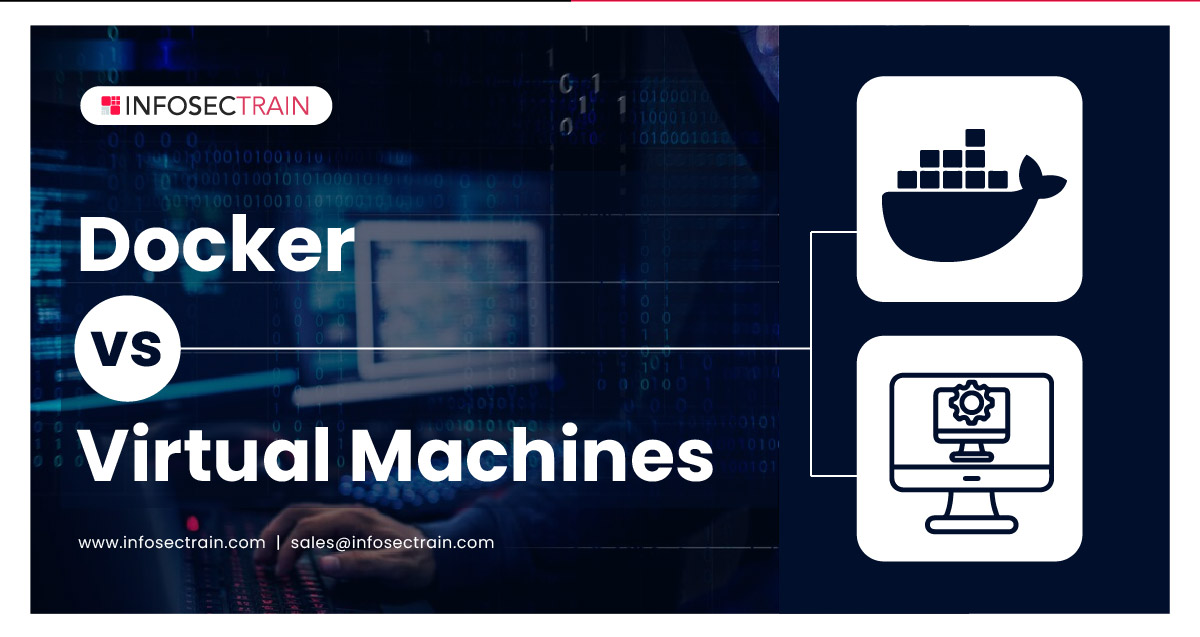Docker vs. Virtual Machines
Virtualization is a powerful tool that helps reduce administrative burdens while boosting cost savings, scalability, and efficiency. Therefore, organizations today look forward to modernizing their organization digitally with the help of virtualization. It is a technology that enables you to develop valuable IT services employing assets that are often restricted to hardware. Virtualization is increasingly required by everyone to boost IT agility, flexibility, and scalability while generating considerable cost savings. However, the distinctions between Docker and Virtual Machines are frequently unclear.

Table of Contents
What is Docker?
What is a Virtual Machine?
Difference between Docker and Virtual Machines
So, in this article, we will highlight the key difference between Docker and Virtual Machines. Keep reading to learn more!
What is Docker?
Docker is an open-source platform for developing, distributing, and running applications. You can manage your infrastructure the same way you manage your apps thanks to Docker, which makes it possible to decouple your applications from your infrastructure and deploy software swiftly. Simply said, Docker is a virtualization technology and software development platform that makes it simple to create, distribute, and manage applications utilizing containers.
You can read “What is Docker and its benefits?” to learn more.
What is a Virtual Machine?
A Virtual Machine (VM) is a computing resource that uses software instead of a physical computer to run and deploy applications. They work best for concurrently executing several applications, monolithic applications, app isolation, and legacy apps that are still supported by previous operating systems. They were developed to carry out tasks that could be dangerous if done directly in the host environment. The software running within a virtual machine cannot interfere with the host computer since it is segregated from the rest of the system.
Difference between Docker and Virtual Machines:
The following are the key differences between Docker and Virtual Machines.
| Parameter | Docker | Virtual Machines |
| Operating System (OS) | Docker containers are hosted on a single physical server running a host OS. | Virtual Machines have the host OS and guest OS like Linux or Windows inside each Virtual Machine regardless of the host OS. |
| Size | A Docker image is compact and often only a few megabytes in size. | A Virtual Machine instance can be many gigabytes or even terabytes in size. |
| Portability | Docker containers are portable due to the lack of a separate operating system. A container can be launched right away after being ported to a different OS. | Virtual Machines have their own OS; therefore, porting a Virtual Machine is more complicated than porting a container and takes much longer due to the size of the virtual computer. |
| Used for | Docker is used to run multiple applications over a single OS kernel. | Virtual Machines are needed to run applications or services on different OS. |
| Speed | Docker containers’ applications launch immediately due to the OS being operational. | Virtual Machines require far more time than a container does to run applications. |
| Security | If an attacker gains access to even one container, they can compromise the entire cluster of containers because Docker resources are shared and not namespaced. | Virtual Machines operate independently with their own kernel and security features. So, applications requiring greater security and privileges run on virtual machines. |
| Performance | Docker containers use the same operating system without any additional software; therefore, they perform well. | Since Virtual Machines use a different OS that consumes more resources, they start slowly and perform poorly. |
| Duration to create | Dockers can be created easily in seconds. | Virtual Machines take a relatively long time to create. |
| Replicability | It is simple to replicate Dockers. We can access Docker images for different applications. | Virtual Machines are challenging to replicate, especially with the rise of VM instances. |
How can InfosecTrain help?
We hope that the fundamental differences between Docker and Virtual Machines in this article have helped you choose the most appropriate option for your needs. If you want to learn all there is to know about Docker and containers, you can enroll at InfosecTrain’s Docker Certified Associate (DCA) as well as various cloud certification training courses to learn about Virtual Machines. We are a leading IT security training and consulting service provider across the globe. Enroll now and leverage the perks of learning from experienced professionals.







 1800-843-7890 (India)
1800-843-7890 (India)